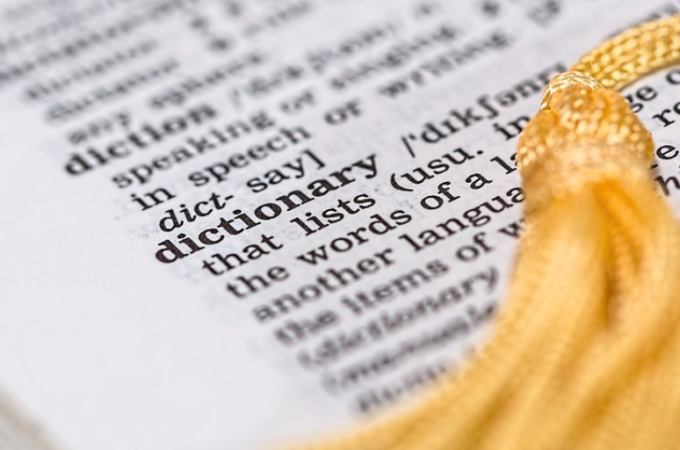As we’ve pointed out elsewhere, those who want to change society begin by changing its language. The new religion has employed this tactic from the beginning. The basic aim has been to vacate the most important words in the English language of any vestige of their original Judeo-Christian meaning. Words like love, freedom, justice, marriage, and, more recently, racism and equality, have all been thoroughly redefined in ways that support and advance the new religion.
Don’t believe me? Just compare the definition of any of those words in Webster’s 1828 Dictionary of the American Language with the definition in any current dictionary, such as the one embedded in Microsoft’s word processing software. I did this a few years back with the definition of marriage.
 Justice is no longer equality of treatment before the law; now it’s equality of outcome.
Justice is no longer equality of treatment before the law; now it’s equality of outcome.- Freedom is no longer the fruit of obeying God’s moral law, but license—the right to do whatever I desire with no moral constraint.
- Love is no longer the act of seeking the good for another, even for an enemy (as defined by God’s moral law). Now love is merely a strong emotion or passion. This is the definition used to advance so-called homosexual “marriage” with its motto “Love Wins.”
The words remain in use, but their historic Judeo-Christian meanings have been scrubbed. Thus redefined, they are put into service to advance an atheistic agenda. As the new religion becomes mainstream in America, the freedom to live according to the old, historic definitions is quickly vanishing. The new religion is intent on forcing everyone to affirm the new definitions, including Christian churches and organizations.
Political Correctness
Political correctness operates under the guise of encouraging respectful public discourse and greater sensitivity in matters involving minorities or other oppressed groups. However, in actuality, it is a rigidly enforced speech-and-behavior code. “Hate speech” describes anything that violates the code.
The consequences for violating the code are becoming increasingly stiff – violators can expect public shaming, censure, and forced re-education (in the form of diversity or sensitivity training). At the more extreme end are fines, the loss of a career and a ruined reputation.
Adherents of the new religion use PC to essentially enforce adherence to the four core doctrines of the new religion. Rather than argue or defend their core beliefs, PC enables them to claim that these are “settled matters” and are “beyond the pale” of acceptable public discussion. An attempt to even discuss them respectfully amounts to hatred, racism, bigotry, homophobia, Islamophobia, etc.
Adhering to a Christian sexual ethic, even privately, is now highly offensive and bigoted against the LGBTQ+ community. Merely having white skin is a mark of racism to some new religionists. Using “terrorist” to describe a Muslim who shoots up a concert hall shouting “Allahu Akbar” brands you “Islamophobic.”
It has gotten to the point where people are fearful of sharing what they think about reality. In an email interview, The Atlantic’s Conor Friedersdorf engaged a 22-year-old San Francisco resident on the stifling PC culture that has grown up around that city. He made the following observation:
[It’s] almost impossible to have polite or constructive political discussion. Disagreement gets you labeled fascist, racist, bigoted, etc. It can provoke a reaction so intense that you’re suddenly an unperson to an acquaintance or friend. There is no saying ‘Hey, I disagree with you,’ it’s just instant shunning. Say things online, and they’ll try to find out who you are and potentially even get you fired for it. Being anti-PC is not about saying ‘I want you to agree with me on these issues.’ It’s about saying, ‘Hey, I want to have a discussion and not get shouted down because I don’t agree.
An anonymous writer at The Federalist spoke for many in describing the frustration people feel at this increasingly prevalent phenomenon:
We don’t want to end political correctness so that we can say hateful things. We want to stop feeling silenced and condemned for having alternative viewpoints. We want to articulate thought-provoking, uncomfortable truisms, and not be told, ‘you can’t say that,’ without even a modest effort at explaining why …
When confronting people who disagree with you, the best tactic is to prove why they’re wrong instead of shutting them up. Have enough faith in your own arguments to welcome dissenting opinions; if your ideas are truly superior, it will show. No need to get emotional, indignant, or defensive.
Weaponized Emotions
As with political correctness, hyperbolic claims of emotional duress and gratuitous outbursts of anger, pain and outrage, usually combined with excessive foul language, are used to prevail by silencing opposing views. For proponents of the new religion, “hurt feelings,” feeling disrespected, or being offended are now grounds to punish, penalize and defeat opponents without ever having to debate them.
Writing in The Federalist, Robert Tracinski calls this tactic an “appeal to emotion.” One “specifically designed to make rational analysis of the issues look not just inappropriate, but positively immoral.” He goes on to note that “the purpose … is to make logical analysis seem insensitive … to [oppressed groups].”
How did we come to this point? Postmodern relativism denies the existence of a real world “out there” that we must conform to. There is no God, no transcendent morality, no good or evil. Rather, reality is socially constructed. Without objective, transcendent truth, reason and logic are undermined and we are left with feelings in the driver’s seat. And while emotions are good and important, they are also very powerful. They can be downright dangerous when decoupled from reason, which is what the new religion does.
 In his famous confrontation with aggrieved students at Yale University, Nicholas Christakis asks the students, “Who gets to decide what [speech, language] is offensive? Who decides?” A female student answers: “When it hurts me.” Translation: “My emotions (my claims of hurt, emotional pain and suffering) trump your right to free speech. End of discussion!”
In his famous confrontation with aggrieved students at Yale University, Nicholas Christakis asks the students, “Who gets to decide what [speech, language] is offensive? Who decides?” A female student answers: “When it hurts me.” Translation: “My emotions (my claims of hurt, emotional pain and suffering) trump your right to free speech. End of discussion!”
Alarmingly, leading-edge thinkers of the new religion like John Corvino, a professor of philosophy at Wayne State University, are laying the groundwork for a new legal standard that he describes as “dignitary harm.” This would replace “material harm” (physical injury, stolen or damaged property, etc.) as a new legal standard for prosecution and punishment by the state. Corvino defines “dignity harm” as “causing people to feel inferior, intentionally or not” (italics added). Here we see it again. My feelings trump your right to free speech or freedom of religion. If this standard prevails, the state could fine or even jail people on the grounds of claims of “hurt feelings.” There’s another new definition: “violence” now means “hurt feelings.”
Albert Mohler describes the threat this poses to our American system of government.
If making someone feel morally inferior, intentional or not constitutes [legal] harm … that means the end of … any religion based on a claim to revelation. Taken to its logical conclusion, it means the end of all moral judgment… This idea of dignitary harm may be the biggest single threat to religious liberty … in our immediate future.
If “hurting someone’s feelings, intentionally or not” becomes a legal standard for prosecution and punishment, this toxic new religion will effectively become the established religion of America, to the exclusion of every other faith.
In the final post we’ll consider how victimization is leveraged for power.
- Scott Allen






